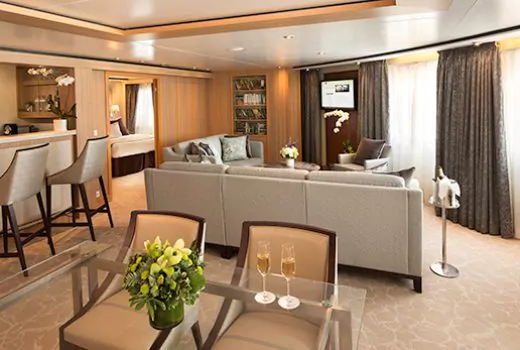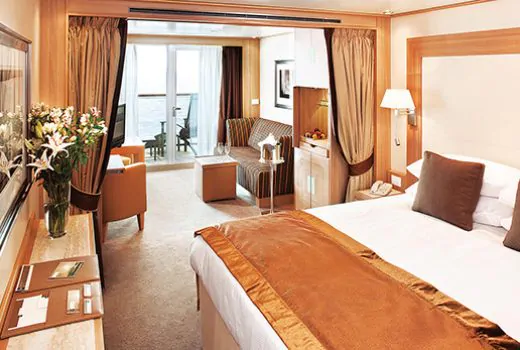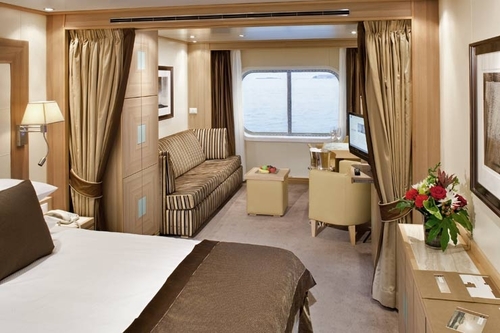Spains Southern Coast & Riviera Gems
- 9 Apr ‘25
- 14 nights
- Departing from Lisbon
- Seabourn Sojourn
-
Inside price fromCall for price
-
Outside price from$11,399*/pp
-
Balcony price from$12,999*/pp
-
Suite price from$23,799*/pp
YOUR ITINERARY
Lisbon, Portugal - Gibraltar, British Territory - Tangier, Morocco - Almeria, Spain - Alicante, Spain - Valencia, Spain - Barcelona, Spain - Palamos, Spain - Sete, France - Cannes, France - Scenic cruising the Calanques - Golfo Aranci, Sardinia, Italy - Portovenere, Italy - Monte Carlo, Monaco
The great period of “the Discoveries” accounted fo...
The great period of “the Discoveries” accounted for phenomenal wealth brought back from India, Africa and Brazil by the great Portuguese navigators. Gold, jewels, ivory, porcelain and spices helped finance grand new buildings and impressive monuments in Lisbon, the country’s capital city. As you sail up the Tagus River, be on deck to admire Lisbon’s panorama and see some of the great monuments lining the river. Lisbon is one of Europe’s smallest capital cities but considered by many visitors to be one of the most likeable. Spread over a string of seven hills, the city offers a variety of faces, including a refreshing no-frills simplicity reflected in the people as they go unhurriedly through their day enjoying a hearty and delicious cuisine accompanied by the country’s excellent wines.
With Spain to the north and Morocco to the south, Gibraltar is ...
With Spain to the north and Morocco to the south, Gibraltar is the famous promontory dominating the narrow entrance to the Mediterranean. Its position led to its seizure by the Moors in 711 as a prelude to the conquest of Spain. The Moorish influence includes the name Gibraltar, a corruption of “Jebel Tariq” (Tariq’s Mountain), named after the Moorish commander Tariq who built the first fortification. In ancient times Gibraltar was regarded as one of the two Pillars of Hercules, which marked the western limits of the known world. Known commonly as “The Rock,” Gibraltar is full of natural caves and manmade tunnels. The Rock itself, composed of limestone and gray marble, is geographically part of the Iberian Peninsula. Politically, the British have controlled Gibraltar for over two centuries. This tiny self-governing British Colony welcomes you to enjoy its historical sites, magnificent views, beautiful beaches and duty free shops.
Situated just across the narrow Strait of Gibraltar from Eu...
Situated just across the narrow Strait of Gibraltar from Europe, Tangier has long comprised a hybrid culture that is nearly as European as it is African. Standing atop Cap Spartel, one can gaze down on the place where the Atlantic meets the Mediterranean. The “Hollywood” district where the foreign embassies have traditionally been located reflects the European influence. But ascending the hill above the waterfront, one enters the narrow, winding alleys of the Kasbah, the city’s oldest, most Moroccan section. Down the coast, nearby Tetouan retains a nearly untouched walled medina, with sections originally occupied by Andalusian, Berber and Jewish populations. It is small enough that visitors can explore it without risking becoming lost, making it a perfect choice as a UNESCO World Heritage Site.
Almeria is a seaside city in Andalucia in the provi...
Almeria is a seaside city in Andalucia in the province of the same name. The picturesque town is dominated by the hilltop Alcazaba fortress, originally built by the Caliph of Cordoba during the Moorish occupation and later expanded by Christian rulers. The cathedral dates from 1524, and replaces an earlier one lost in an earthquake in 1522. Its fortress-like structure bespeaks the continuing raids of pirates from North Africa at that time. Enjoy the town, the smaller villages of Mojacar or Roquetas del Mar, and the rugged coast of the Cabo de Gata.
This gracious provincial capital lies at the heart of the popu...
This gracious provincial capital lies at the heart of the popular Costa Blanca resort region. Alicante has been a fashionable winter retreat for many years, thanks to its mild climate, swaying palms and beautiful beaches. Sun-seekers from throughout Europe, along with Algerian and Senegalese immigrants, combine to create a truly cosmopolitan air. The Castillo Santa Barbara looms above, adding to the romantic ambience. Take a stroll on the broad Explanada de Espana, the inviting promenade along the harbor, or browse through the many shops on Calle Mayor.
Valencia is located in the middle of Europe’s most dens...
Valencia is located in the middle of Europe’s most densely developed agricultural region. Originally a Greek settlement, the town was taken over by Romans in 138 BC and turned into a retirement town for old soldiers. The Moors controlled the land for 500 years, and this fertile plain, which today yields three to four crops, was considered to be heaven on earth. El Cid conquered Valencia for Spain in 1094, but it fell back into Moorish hands after his death. Incorporated into Spain in the 15th century, Valencia remains the nation’s breadbasket.
Barcelona, the capital of Catalonia, is said to have bee...
Barcelona, the capital of Catalonia, is said to have been founded by the Phoenicians, and was once the rival of the powerful states of Venice and Genoa for control of the Mediterranean trade. Today, it is Spain’s second largest city and has long rivaled, even surpassed Madrid in industry and commerce. The medieval atmosphere of the Gothic Quarter and the elegant boulevards combine to make the city one of Europe’s most beautiful. Barcelona’s active cultural life and heritage brought forth such greats as the architect Antonio Gaudi, the painter Joan Miro, and Pablo Picasso, who spent his formative years here. Other famous native Catalan artists include cellist Pau Casals, surrealist Salvador Dali, and opera singers Montserrat Caballe and Josep Carreras. Barcelona accomplished a long-cherished goal with the opportunity to host the Olympics in 1992. This big event prompted a massive building program and created a focal point of the world’s attention.
Located at the foot of the mountains on Spain’s rugged...
Located at the foot of the mountains on Spain’s rugged Costa Brava, Palamos boasts seven superb beaches, Iberian archeological remains from the year 6 BC, and the Church of Sant Esteve on the beach. Highlighting the town center is its 16th-century cathedral.
The port town of Sete hugs the tiny Mont St. Clair...
The port town of Sete hugs the tiny Mont St. Clair, and is caught between the Mediterranean and the Bassin de Thau, a salt lake directly behind it. It is crisscrossed by numerous canals which link the lake to the sea, and connected by 12 bridges. Along the quay, renovated buildings provide a multitude of architectural details from the 18th and 19th centuries. The life of the town is found in its squares: Place Leon Blum, with its fountain and Wednesday morning flower market; Place Aristide, with its old fashioned bandstand; and Place de la Republique, with its huge retaining walls and vaulted loggias. Sete retains its historic purpose as a fishing boat haven for North African trade; the old harbor dates from the time of Louis XIV.
Cannes was founded in the 2nd century BC by a Liguria...
Cannes was founded in the 2nd century BC by a Ligurian tribe, and was subsequently colonized by the Romans in 154 AD. During the town’s entire history it went through a period of upheaval and desolation by war. In 1834, Lord Brougham, an English aristocrat, was so enchanted by Cannes that he decided to settle there. This marked the beginning of the town’s affluence, with luxury residences springing up to provide winter accommodations for international nobility. From 1930 onward, Cannes became a summer resort. Its local economy had traditionally relied on fishing, but was quickly replaced by tourism. Today, Cannes is best known for its world famous film festival and, for two weeks in May each year, attracts the brightest and most talented stars of the silver screen.
The Sardinian coastline is serrated by deep-cut co...
The Sardinian coastline is serrated by deep-cut coves of sparkling sea, surrounded by rocky prominences and edged in lovely strands of beach. The Aga Khan fell in love with the place, and dubbed it the Costa Smeralda, creating a magnet for the global glitterati. At Golfo Aranci, shining arcs of silvery sand are linked into a larger curve, encircled by a muscular peninsula that looms protectively between the town and the sea. It looks expensive, and it is.
The Gulf of La Spezia has been so frequent a subject for poe...
The Gulf of La Spezia has been so frequent a subject for poets over the years – from Dante and Petrarch to Byron and Shelley – that it is often referred to as the Golfo dei Poeti. The elongated yellow and orange houses, which line the harbor stretch up the steep slope toward ancient battlements beyond. Mentioned as a landing place in Claudius Ptolemy’s “General Geography” (150 AD), today Portovenere is a resort with a friendly and relaxed atmosphere.
The Principality of Monaco is the epitome of Riviera chic. T...
The Principality of Monaco is the epitome of Riviera chic. This tiny enclave of 370 acres surrounds a sheltered harbor that draws yachts from around the world to enjoy the beautiful scenery, mild weather and elegant casino. Glamorous Monte Carlo is one of Monaco’s four quarters, which also include La Condamine, the business district; Monaco-ville, the capital; and Fontvieille, an area built on reclaimed land. Ruled by Prince Albert II, Monaco has a population of over 32,000, of which about 16 percent are citizens, or Monégasques.
YOUR SHIP - The Seabourn Sojourn
Seabourn Sojourn enchants her guests with an array of public areas scaled to encourage a relaxed sociability. One of the most unusual features of Seabourn Sojourn and her sisters is Seabourn Square, an ingenious “living room” that replaces the traditional cruise ship lobby with a welcoming lounge filled with easy chairs, sofas and cocktail tables; making it more inviting and relaxing on a small ship cruise. An enclave in its center houses knowledgeable concierges discreetly seated at individual desks.
Seabourn Sojourn enchants her guests with an array of public areas scaled to encourage a relaxed sociability. One of the most unusual features of Seabourn Sojourn and her sisters is Seabourn Square, an ingenious “living room” that replaces the traditional cruise ship lobby with a welcoming lounge filled with easy chairs, sofas and cocktail tables; making it more inviting and relaxing on a small ship cruise. An enclave in its center houses knowledgeable concierges discreetly seated at individual desks.
Beauty Salon
Facial Treatments
Massage
Sauna
Spa
Swimming Pool
Thalassotherapy Pool
Whirlpool
In-Suite Service
Patio Grill
Sky Bar
The Colonnade
The Restaurant
The Restaurant 2
Gym
Sports Deck
Description
Seabourn Sojourn enchants her guests with an array of public areas scaled to encourage a relaxed sociability. One of the most unusual features of Seabourn Sojourn and her sisters is Seabourn Square, an ingenious “living room” that replaces the traditional cruise ship lobby with a welcoming lounge filled with easy chairs, sofas and cocktail tables; making it more inviting and relaxing on a small ship cruise. An enclave in its center houses knowledgeable concierges discreetly seated at individual desks.
Relaxation
Beauty Salon
Facial Treatments
Massage
Sauna
Spa
Swimming Pool
Thalassotherapy Pool
Whirlpool
Food and Drink
In-Suite Service
Patio Grill
Sky Bar
The Colonnade
The Restaurant
The Restaurant 2
Fitness
Gym
Sports Deck
STATEROOMS

suite

balcony


